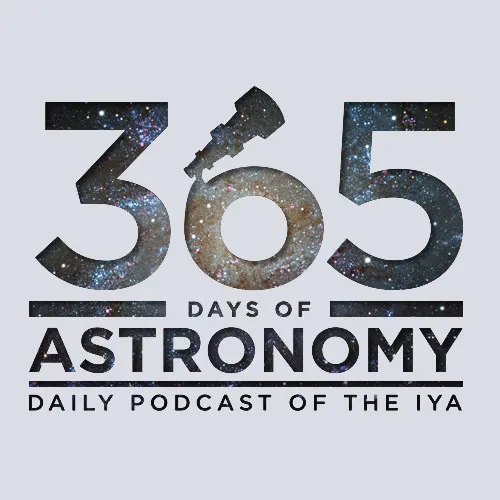
The 365 Days of Astronomy
The 365 Days of Astronomy podcast launched in 2009 as part of the International Year of Astronomy. This community podcast continues to bring you day after day of content across the years. Everyday, a new voice, helping you see the universe we share in a new way. This show is managed by Avivah Yamani, edited by Richard Drumm. This podcast is funded through Patreon.com/CosmoQuestX and produced out of the Planetary Science Institute.
- Update frequency
- every day
- Average duration
- 26 minutes
- Episodes
- 321
- Years Active
- 2024 - 2025

Exoplanet Radio - Life in Terminator Zones
From September 12, 2023.
Hosted by Tony Darnell.
Based on our experience here on Earth, we know life here to be tenacious and ubiquitous. Even in the harshest climates, if we look hard enough, we can…

Astronomy Cast Ep. 18: Black Holes Big & Small
https://www.astronomycast.com/archive/
From January 8, 2007.
We’re finally ready to deal with the topic you’ve all been waiting for: Schwarzschild swirlers, Chandrasekhar crushers, ol’ matter mangler…

Travelers in the Night Eps. 307E & 308E: Asteroids 2016 & Suddenly Bright
Dr. Al Grauer hosts. Dr. Albert D. Grauer ( @Nmcanopus ) is an observational asteroid hunting astronomer. Dr. Grauer retired from the University of Arkansas at Little Rock in 2006. travelersinthenigh…

NOIR Lab - The Largest Radio Jet In the Early Universe
Making use of the Gemini North telescope, one half of the International Gemini Observatory, astronomers have characterized the largest-ever early-Universe radio jet. Historically, such large radio je…

EVSN - Temperatures That Kill
From February 19, 2025.
Let's take a fast-paced journey thru all that's new in space and astronomy, including a potentially killer asteroid, a new look at the history of Earth's water, and a mini-qua…

Actual Astronomy - Observer’s Calendar for March
Hosted by Chris Beckett & Shane Ludtke, two amateur astronomers in Saskatchewan. [email protected]
The Observer’s Calendar for March 2025 on Episode 472 of the Actual Astronomy podcast. I’m C…

Big Impact Astronomy - John Goldsmith
Hosted by Mike Simmons.
John Goldsmith is a prolific astrophotographer from WA, Western Australia. He has 35 years experience and was mentored by the late Akira Fujii.
Mike Simmons is the founder o…

Ask A Spaceman Ep. 243: So Is the Warp Drive Legit or Not?
What is an Alcubierre warp drive? What would it take to make it work? Could it propel spacecraft even below the speed of light? I discuss these questions and more in today’s Ask a Spaceman!
Support…

Astronomy Cast Ep. 746: Dust Storms
https://www.youtube.com/watch?v=iTaLgpL5NFI
Streamed live Feb 24, 2025.
We have dust storms on Earth and of course the famous dust storms on Mars. There are even dust storms on Titan. What causes the…

Travelers in the Night Eps. 305E & 306E: Newborn Planets & Marrakech
Dr. Al Grauer hosts. Dr. Albert D. Grauer ( @Nmcanopus ) is an observational asteroid hunting astronomer. Dr. Grauer retired from the University of Arkansas at Little Rock in 2006. travelersinthenigh…

Last Minute Astronomer - March Episode
March 2025 says goodbye to Saturn, welcomes a total lunar eclipse, and continues hanging out with the rest of the planets. Hi everybody, I’m Rob Webb, your Last Minute Astronomer, bringing astronomy …

EVSN - Black Holes Can Clear Way For Star Formation
From June 15, 2021.
Contrary to the destructive role supermassive black holes are thought to play in the lives of stars, it turns out that certain types of galaxies benefit from black holes clearing …

H'ad Astra Historia Ep. 202: Say Cheese
We’re celebrating the 35th anniversary of the first and only Portrait of the Solar System, a series of images taken by Voyager 1 on 14 Feb 1990. Dr. Candice Hansen-Koharcheck tells the story behind t…

Cheap Astronomy - Dear CA #116: The Universe
Our very big home.
Dear Cheap Astronomy – Just why?
Asking why the Universe is doesn’t have to be a spiritual inquiry into purpose. We can look across the Universe and observe that things happen in v…

Awesome Astronomy - February Part 1
Paul Hill and Dr. Jenifer “Dr. Dust” Millard host.
Damien Phillips, John Wildridge and Dustin Ruoff produce.
The world veers towards madness, asteroids threaten destruction and Gaia is no more. But …

Astronomy Cast Ep. 745: How We Know If Asteroids Will Attack
https://www.youtube.com/watch?v=MD47H6ZKbxo
Streamed live Feb 20, 2025.
I’m sure you’ve heard the news, asteroid 2024 YR4 has a tiny chance of hitting Earth in 2032. How do astronomers discover these…

Travelers in the Night Eps. 303E & 304E: Dust Stories & Big Splash
Dr. Al Grauer hosts. Dr. Albert D. Grauer ( @Nmcanopus ) is an observational asteroid hunting astronomer. Dr. Grauer retired from the University of Arkansas at Little Rock in 2006. travelersinthenigh…

The Cosmic Savannah - Ep. 66: Meertime Mysteries – Pulsars & Prizes
Hosted by Dr. Jacinta Delhaize, Dr. Tshiamiso Makwela & Dr. Daniel Cunnama.
From October 19, 2023.
Professor Matthew Bailes returns to discuss his recent work on Pulsars as well as his thoughts and f…

EVSN - Moons May Be Beneficial to Life Beyond Earth
From February 4, 2022.
New simulations find that to form a moon with a similar size ratio to our own system, certain types of planets are needed. And that type of moon-planet system could then be ben…

Actual Astronomy - Naked Eye Astronomy
Hosted by Chris Beckett & Shane Ludtke, two amateur astronomers in Saskatchewan. [email protected]
- About 6,000 stars are visible to the unaided eye and some even in the day
- Eric Saw eta C…